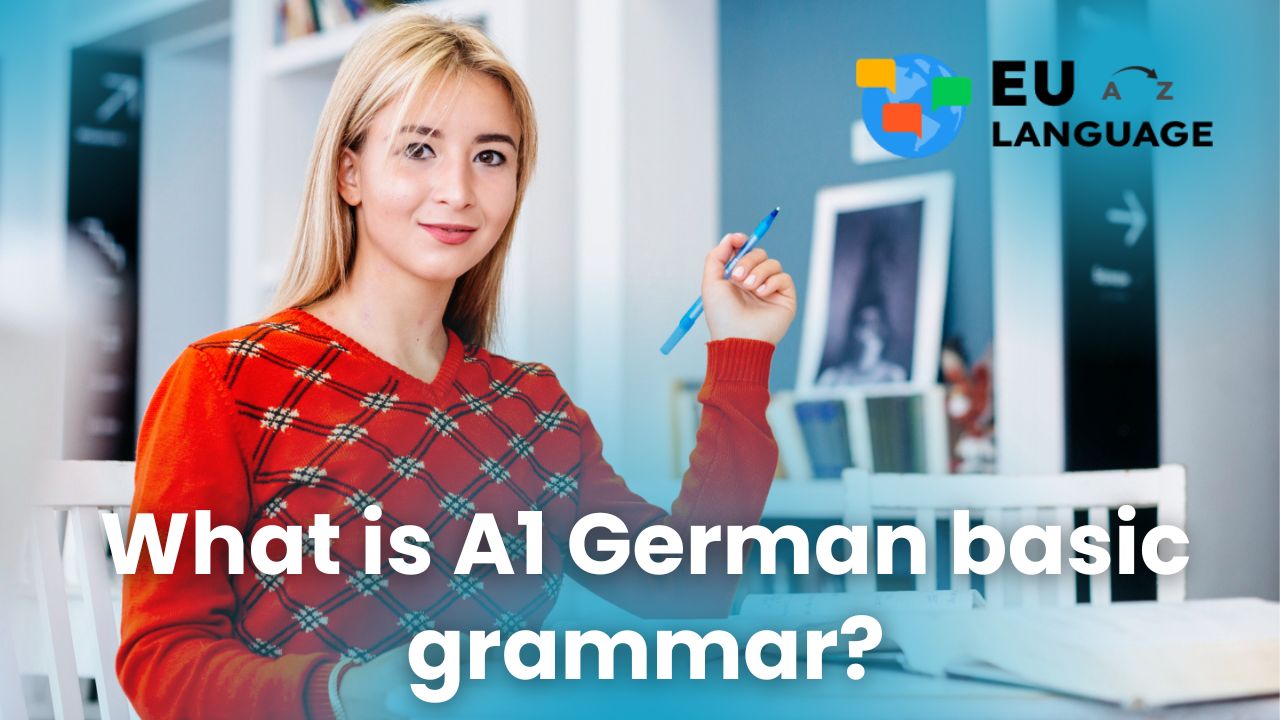Congratulations on embarking on your German learning adventure! A1 German, the foundation of your journey, might seem daunting at first. But fear not, future German speaker! This blog post, aligned with the EUlanguage curriculum, will be your guide to understanding the essential grammar concepts that will get you comfortable with basic German communication.
Building Blocks for Success:
- Articles & Nouns: German nouns come in three genders (masculine, feminine, neuter) and require articles (der, die, das) that change depending on the case. A1 focuses on the nominative case, used for subjects of sentences. Examples: “Der Mann spricht Deutsch.” (The man speaks German), “Die Frau liest ein Buch.” (The woman reads a book). EUlanguage courses will introduce you to these concepts in a clear and engaging way.
- Taming the Plurals: Most German nouns form plurals by adding “-en” or “-s”. However, there are some irregular plurals you’ll learn along the way. Don’t worry, EUlanguage’s curriculum includes helpful memorization techniques and practice exercises.
- Essential Verbs: You’ll start with core verbs like “sein” (to be) and “haben” (to have) in the present tense (Präsens). Learn how to conjugate these verbs according to the subject (ich, du, er/sie/es, wir, ihr, sie) with EUlanguage’s interactive exercises.
Grammar on the Move:
- Simple Sentence Structure: A1 German focuses on forming basic sentences with subject, verb, and object. Practice word order and pay attention to verb conjugations depending on the subject. EUlanguage instructors will guide you through sentence construction with clear explanations and real-life examples.
- Asking and Answering Questions: Learn to ask simple yes/no questions by inverting the verb and subject. Example: “Sprechen Sie Deutsch?” (Do you speak German?) EUlanguage goes beyond memorization, teaching you the logic behind question formation.
- Wh- Questions for Exploration: Who, what, where, when, why? A1 German will introduce you to wh- question words like “wer” (who), “was” (what), and “wo” (where) to form questions and gather information.
Going Beyond the Basics:
- Possessive Pronouns: Learn to say things like “meine Tasche” (my bag) and “dein Buch” (your book) using possessive pronouns. EUlanguage incorporates interactive activities to solidify your understanding of possessive pronouns.
- Numbers 1-20 & Basic Colors: Learning essential numbers and colors is crucial for everyday communication. EUlanguage’s curriculum introduces these in a fun and interactive way, making memorization a breeze.
- Greetings & Farewells: Master basic greetings like “Hallo” (Hello) and “Tschüss” (Goodbye) to navigate social situations with confidence. EUlanguage instructors will provide pronunciation tips to ensure you sound natural.
Remember:
- Communication is Key: Don’t get bogged down in memorizing grammar rules. EUlanguage’s courses prioritize using these structures in simple conversations to develop practical language skills.
- Practice Makes Progress: Consistency is key! Aim for short, daily practice sessions using the resources and guidance provided by EUlanguage.
- Enjoy the Journey: Learning German should be fun! EUlanguage’s curriculum incorporates multimedia elements, interactive activities, and even connects you with native speakers (at higher levels) to keep you motivated.
A1 German is your springboard to fluency with EUlanguage. With our structured curriculum, expert instructors, and engaging resources, you’ll be surprised at how quickly you can grasp the basics and start having conversations in German. Visit our website today to explore our A1 German courses and kickstart your German language adventure! Don’t forget, EUlanguage also offers courses in French, Italian, and Spanish!


